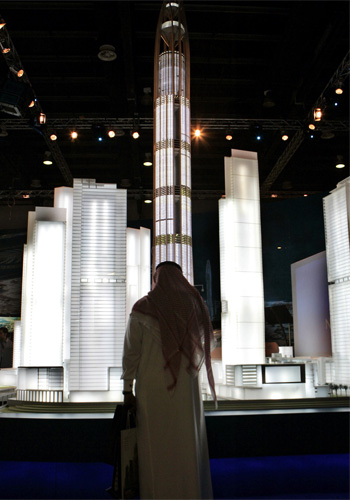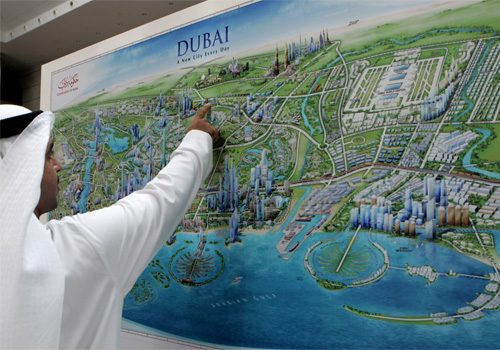

A kick in the shins for Gulf states
SONIA VERMA
Globe and Mail
October 28, 2008
Oil-fuelled wealth proves to be only thin insulation against the effects of the global credit crunch
DUBAI — For British soccer fans, it seemed too good to be true: Zabeel Investments, a Dubai-based sovereign wealth fund, was looking to buy Charlton Athletic, a struggling soccer club mired in more than $30-million (U.S.) of debt.
But late last week, Zabeel suddenly pulled out, blaming the toxic economic climate in the West. The company had decided to focus on "domestic opportunities" instead.
If soccer fans in Britain were shattered, the mood in Dubai was shock. The deal's collapse was one of the most striking signs the party in this oil-rich region was over: State-owned investment vehicles had sobered up, suddenly shunning trophy assets like Charlton.
In the past few weeks, Persian Gulf states have been jolted by the realization that they are not immune to the financial turmoil gripping the globe. Oil-fuelled wealth proved to be only thin insulation against the effects of the credit crunch.
 Real estate agents and analysts say demand remains strong for completed projects in Dubai, but interest in those that are incomplete or not yet built is shaky. Here, a man examines a graphic map of Dubai showing new developments.
Photo: Kamran Jebreili/AP
Sources: Reuters, The Associated Press
© Copyright 2008 CTVglobemedia publishing Inc. All Rights Reserved. Real estate agents and analysts say demand remains strong for completed projects in Dubai, but interest in those that are incomplete or not yet built is shaky. Here, a man examines a graphic map of Dubai showing new developments.
Photo: Kamran Jebreili/AP
Sources: Reuters, The Associated Press
© Copyright 2008 CTVglobemedia publishing Inc. All Rights Reserved. |
 The Gulf region is being hit by the spreading global crisis. Known for its phenomenal oil wealth, stocks are plunging, governments are moving to support their financial systems and real estate projects are feeling the pinch. Here, a man looks at a model for a kilometer-high tower during a real estate exposition in Dubai's financial district.
Photo: Kamran Jebreili/AP
© Copyright 2008 CTVglobemedia publishing Inc. All Rights Reserved. The Gulf region is being hit by the spreading global crisis. Known for its phenomenal oil wealth, stocks are plunging, governments are moving to support their financial systems and real estate projects are feeling the pinch. Here, a man looks at a model for a kilometer-high tower during a real estate exposition in Dubai's financial district.
Photo: Kamran Jebreili/AP
© Copyright 2008 CTVglobemedia publishing Inc. All Rights Reserved.
|
More than $50-billion of foreign deposits has fled the region's banks in recent weeks as investors pulled back.
The price of oil - this region's main export and source of income - plunged, and local stock markets sank to new lows.
Gulf states have had to retrench, with Kuwait moving to prop up its central bank and Saudi Arabia extending special credit to its neediest citizens over the weekend.
The United Arab Emirates has already acted to guarantee bank deposits, and injected billions of dollars into its domestic money markets to encourage interbank lending. Qatar and Kuwait have used their sovereign wealth to buy up stakes in ailing banks and slumping stock.
"It feels a little like we've all woken up in the Twilight Zone," said Jason Goff, head of treasury sales at Emirates NBD.
"People are scared. Nobody in a million years predicted this would happen here," he added.
Economists are scaling back growth forecasts, and the Gulf's once-giddy property market is showing signs of shakiness, with developers now openly talking about construction delays and cancellations as fear spreads, paralyzing buyers.
Property developers have scaled back recruitment, with some companies imposing unprecedented hiring freezes until the economy stabilizes. Credit Suisse said market turmoil and negative sentiment would likely dent property demand in Dubai and Abu Dhabi, while Morgan Stanley predicts a market downturn of at least 10 per cent by 2010.
"These economies are no longer islands unto themselves," said Dr. Henry Azzam, chief executive officer of Deutsche Bank, Middle East and North Africa, and a former economics professor at Beirut University.
"Economic integration with the West brings with it a level of exposure. It forces a certain degree of reflection on how to move forward."
For the region's rulers, the need to take drastic steps to stabilize markets is unprecedented. Gulf leaders tend to view themselves as mavericks, building skyscrapers in the middle of the desert and man-made islands in the middle of the ocean, all in an effort to attract foreign investment and diversify their economies away from oil wealth.
The strategy has so far worked in countries like the United Arab Emirates, which has boasted double-digit growth in the past five years. Only in the past month have the hidden costs of that progress been revealed.
As Gulf states refocus their resources domestically, there is dwindling interest in acquiring assets in the West, even at fire sale prices.
"Anything in the West is seen as toxic," Dr. Azzam said. "They are not going to be the ones to bail out the banks any more. It's just not worth it," he said.
Foreign assets of Gulf Co-operation Council states were estimated to top $1-trillion last year. Some funds have seen their existing investments suffer massive losses.
The Kuwait Investment Authority's investment in Citigroup last January shows a $270-million loss.
To be sure, Gulf states are in a far better position to survive financial turbulence than the West.
Even though oil prices have dropped, countries including Saudi Arabia, Abu Dhabi and gas-rich Qatar have deep reserves of savings to cushion their countries from any real devastation.
Dubai is still viewed as a refuge for worried professionals, whose jobs are quickly evaporating in Western financial capitals. Some recruitment companies have reported a tenfold jump in applications in the past two months with bankers and estate agents leading the charge.
Gulf leaders and central bankers remain self-assured, arguing that their economies are fundamentally sound and able to withstand the current turmoil.
Echoing the optimistic outlook of other leaders, Sultan Nasser al-Suweidi, the UAE's central bank governor, said yesterday that the liquidity crunch in the region's banking system was easing and soon the region's economies would return to normal. "Things are getting better and stabilizing," he said.
But confidence alone won't calm markets, analysts say, and some suggest a co-ordinated action plan among Gulf states is needed to address the region's problems.
For now, leaders appear to be waiting to see if things get worse.
"If there is a need, we will do more," Mr. al-Suweidi said.
Special to The Globe and Mail
*****
Gimme shelter
As the financial crisis creeps into the Middle East, here's what others countries did yesterday to shore up battered markets.
The U.S. Treasury Department started moving $125-billion (U.S.) to nine major banks by buying ownership stakes, the first big transfer since the $700-billion bailout was passed this month.
Australia's central bank took the rare step of buying Australian dollars twice in the past few days to limit their plunge.
Crisis-hit Iceland said it needs another $4-billion in loans on top of the $2-billion it wants from the IMF .
Japan's Prime Minister Taro Aso told senior officials to draw up steps to calm volatile markets and to fend off further fallout.
News services